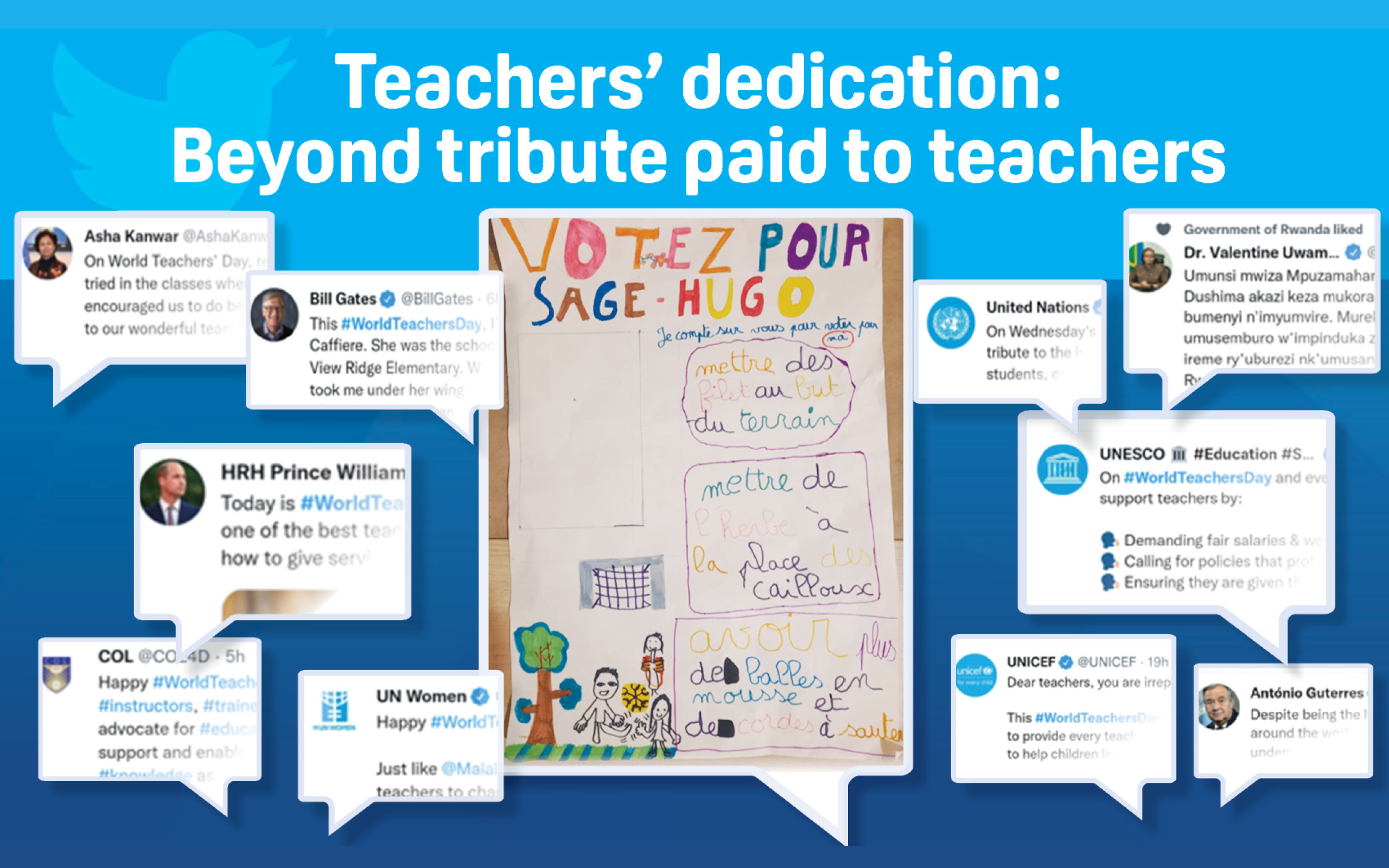
By Dr Evode Mukama
Adviser: Teacher Education
After reading some tweets written about teachers by several people and international organisations on the World Teachers’ Day, I felt proud as a former teacher in primary, secondary and university education. I also liked the card, placed in the middle of the poster above, designed by a nine-year old Rwandan boy called Sage-Hugo Imena.
The card written in French portrays a voting campaign to become a P4 class representative at Oscar Cléret Elementary School: “I count on you to vote for me”, Sage-Hugo wrote with three action points: 1) environment protection; 2) sports; and 3) community health. The art of teachers to help Sage-Hugo realise his potential is hidden in the background of the boy’s understanding to set up his campaign goals and present them briefly in an attractive way. This is all about teachers’ everyday job. The purpose of this reflection is to analyse how the job of teachers was featured in some tweets shared on the World Teachers’ Day 2022 and draw some lessons.
Teachers: Lifeblood of education
One of the tweets that touched me in a special way was written by the President and CEO of the Commonwealth of Learning, Professor Asha Kanwar. She commented, “On World Teachers’ Day, remember how hard we tried in the classes where the teachers liked us and encouraged us to do better and better? More power to our wonderful teachers!”
The power of teachers that Prof Kanwar referred to is echoed in the Bill Gates’ tweet. This great world changer explained how a school librarian, Mrs. Blanche Caffiere, shifted his mind. Gates was then nine years old, the same age as Sage-Hugo today. The co-founder of Microsoft and billionaire philanthropist praises Mrs. Caffiere in these sweet words: “she took me under her wing and taught me that my love of reading was a strength. To this day, I think about how she changed my life.” The theme of the World Teachers’ Day 2022 was “The transformation of education begins with teachers”. In this context, Nelson Mandela’s words resonate with their full meaning: “Education is the most powerful weapon you can use to change the world”. Putting this differently, teachers’ dedication is of a paramount importance in achieving the 2030 Agenda for Sustainable Development Goals.
In fact, the socioeconomic transformation of our society depends on the quality of the human capital out there as the HRH Prince William of Wales posited about his late grandmother, Queen Elizabeth ll. He stated: “Today is #WorldTeachersDay I would like to thank one of the best teachers in the world that taught us how to give service and devotion to your country.” In a similar vein, the Minister of Education in Rwanda, Valentine Uwamariya, hailed teachers’ work in transforming people’s lives and the country by saying: “Let us work together to be the catalyst for change that leads to improving the quality of education as a contribution to building the Rwanda we want” (my translation from Kinyarwanda). The teachers’ transformational power embedded in the tweets above mentioned can be summarised in the quotation from Michael Fullan (1993, p. 46): “Teachers must succeed if students are to succeed, and students must succeed if society is to succeed”. Fullan’s Change Forces are still and will remain relevant for many years.
“More power to our wonderful teachers!”
Teaching is a noble job, a vocation, a talent, an art but also a science that can be taught. However, teaching requires sometimes sacrifice and, in some cases, humiliation. The UN Secretary-General, Antonio Guterres, has praised teachers by saying: “Despite being the lifeblood of education systems around the world, teachers are under-trained, undervalued & underpaid.” For action, the UN’s tweet on the World Teachers’ Day 2022 sounds as a response to Guterres: “To transform education, it’s vital that teachers are heard, supported & empowered”.
UNESCO identifies three key action points to ensure teachers’ empowerment: welfare, protection, and autonomy. UNESCO tweeted: “On #WorldTeachersDay and every day, let’s support teachers by: Demanding fair salaries & working conditions; Calling for policies that protect them; Ensuring they are given the autonomy they need.” However, some questions remain: How can teachers be empowered to do their job better in concrete terms? What lessons can we learn from COL’s initiatives? Though this reflection does not aim to provide statistics, the next paragraph will provide some answers to these questions.
In 2021/2022 only, with a concern to create and widen learning opportunities, COL supported the Teacher Management Agency in Ghana to train over 45,000 teachers in digital skills, leadership and inclusive education as part of the teacher empowerment. Similar programmes have been initiated in Zambia, Gambia, Sri Lanka, and in many other countries. COL supported several countries of the Commonwealth to develop national professional competency frameworks for teachers, national and institutional open distance learning (ODL) and technology-enabled learning (TEL) policies and-or strategies.
To respond to the real needs of teachers, COL has worked with different countries to conduct national baseline studies on teacher policies and practices with ODL and TEL such as in Ghana, Rwanda, and South Africa. COL has also contributed to teacher training institutions through teacher training programmes, staff capacity building, creation of courses and MOOCS (https://www.mooc4dev.org/courses) and other open educational resources. As well, COL has been involved in improving teachers’ lives and livelihoods through offering gender-responsive learning opportunities and community initiatives, just to name a few other examples.
Conclusion
I would have liked to see more teachers voice their opinions on Twitter on World Teachers’ Day 2022. Nevertheless, several tweets show that people around the world strongly paid tribute to teachers due to their dedication in making a difference in their lives through education. If we believe that teachers hard work matters for educational transformation, then we need to be concerned with teachers’ working conditions. If teachers changed our lives and created conditions for us to become who are today, then we have also to care about their lives and livelihoods.
Beyond “thank you teacher”: Concrete actions.


